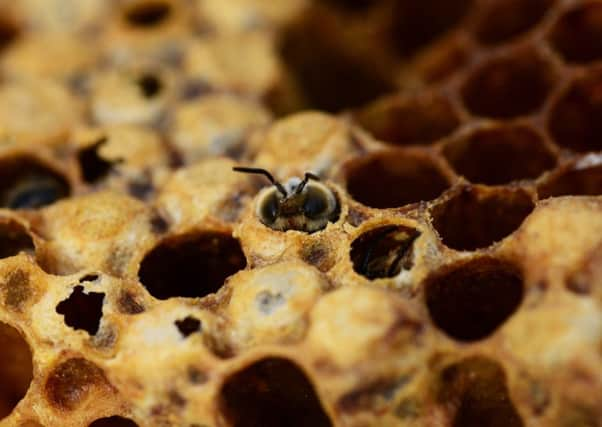Recruitment drive to monitor impacts of bee-friendly farming


National charity, the Bumblebee Conservation Trust, is appealing directly to farmers for help because of a shortage of volunteers to carry out the watchdog role.
The monitoring of how bumblebees are reacting to wildlife-sensitive farming is vital to help the Trust establish a detailed assessment of what measures work as they seek to reverse the insect’s plight.
Advertisement
Hide AdAdvertisement
Hide AdBritain relies on bumblebees to pollinate the crops that feed the nation, yet two species of the insect are known to have become extinct in the last 50 years.
The decline is blamed on the historic and substantial loss of bee-friendly habitats. Since the Second World War, 98 per cent of wildflower meadows have been lost as a result of more intensive agricultural methods that were designed to meet the needs of feeding Britain’s growing population.
More recently, many farmers have re-established field margins and have turned over other areas of unproductive farmland to wildlife habitats, but more help is needed to understand how these measures are benefiting bumblebees.
The Bumblebee Conservation Trust is a small charity of 20 staff and so it is seeking farmers’ help to carry out monthly ‘bee walks’.
Advertisement
Hide AdAdvertisement
Hide AdThe walks involve recording sightings of six common species of bumblebee, and the flowers they feed on, in a one-kilometre section of land between March and October each year.
Gill Perkins, the Trust’s chief executive, said: “Finding bee walkers has been difficult which is why we have gone down the route of asking farmers to monitor their own land - hopefully this will work out a lot better.”
The Trust has a unique partnership with Flaxby-based free range egg wholesalers Chippindale Foods, near Harrogate, which works with nine farmer suppliers who they have encouraged to establish bumblebee-friendly habitats on their farms.
In doing so, the company has taken a lead on bumblebee-sensitive farming in the poultry sector, with the eggs from its bee-friendly farms being sold under Chippindale’s ‘Yorkshire’ range from the Co-op and Morrisons.
Advertisement
Hide AdAdvertisement
Hide AdOn Monday, representatives from both Chippindale and the Trust will lead a ‘bee walk’ training session in Market Weighton where they will encourage more farmers to monitor bumblebees.
Mrs Perkins said: “The Chippindale model is excellent and we hope other chicken or free range farms take this up because it’s been so successful.”
Richard Pearson, Chippindale’s head of agriculture, said the changes on suppliers’ farms were paying off for bumblebees.
“Numbers are up year on year, and variety is also increasing,” he said.
Advertisement
Hide AdAdvertisement
Hide AdThe firm’s managing director Nick Chippindale added: “We are proud to be supporting farmers and their families to become bee walkers, helping to monitor the impact of the work they are doing. The response from the families involved has been fantastic and we’re really looking forward to joining more of them on their farms as they’re trained up.”
BEES SAVE UK ECONOMY MILLIONS
Such is the importance of bumblebees to food production in Britain that 65,000 boxes of commercially-bred bumblebees are imported from other European countries, such as Romania and Belgium, every year.
According to the Bumblebee Conservation Trust, one in three mouthfuls of food eaten in Britain is down to the role of bumblebees as the nation’s primary pollinators of crops.
In total, 84 per cent of all crops grown in the UK depend on pollination and if all our pollinators were wiped out, it would cost the British economy a massive £691m to pollinate those crops using alternative chemical applications.